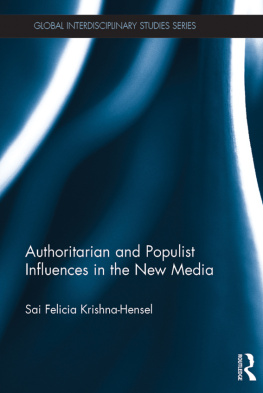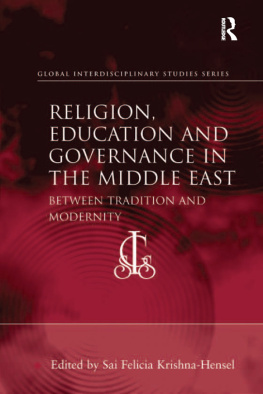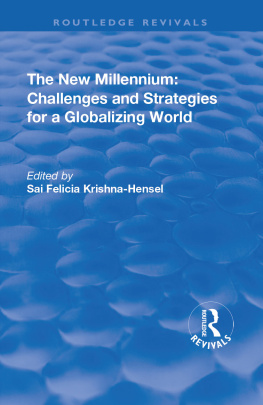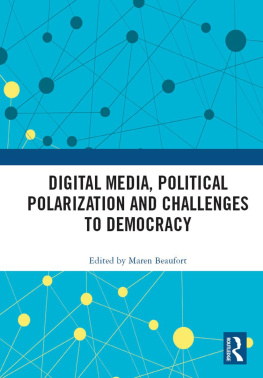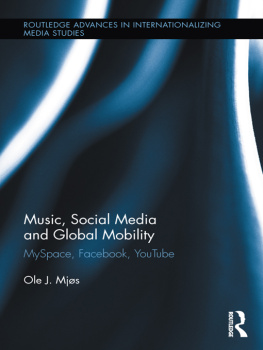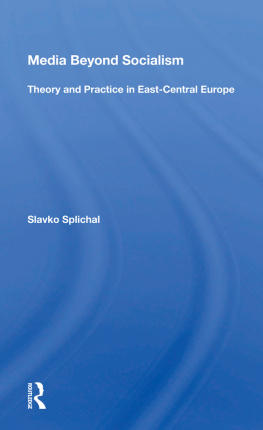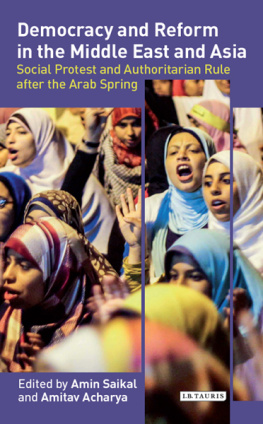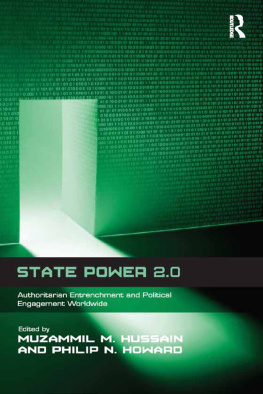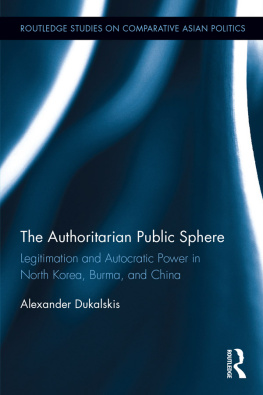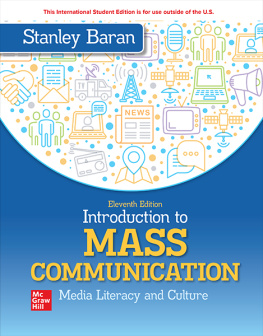Authoritarian and Populist Influences in the New Media
The media is often viewed as a primary gauge that reflects the changing political landscape as societies transition from authoritarian regimes to democracies. Chronicling the process through media analysis provides deeper insights into the relationship between technology, the state, and social forces that are reflected in the publics communications. This volume explores the challenges and political conditions that have shaped the media in several representative studies of the media in the Middle East, Asia, Eastern Europe, and Africa. The contributors analyze the legacy of the past on the development of the media in post-authoritarian regimes and explore the relationships between media, communication industries (public relations), and politics. The use of new communications technologies to manipulate the media and the public introduce a novel use of social media by populists as well as authoritarian regimes and their proxies.
This book presents a comparative and global investigation of the role of the media in the realignment from established policies to an emerging milieu of new channels of communication that challenge traditional media practices.
Sai Felicia Krishna-Hensel is Director of the Interdisciplinary Global Studies Initiative at Auburn Montgomery, USA.
Global Interdisciplinary Studies Series
Series Editor: Sai Felicia Krishna-Hensel
The Global Interdisciplinary Studies Series reflects a recognition that globalization is leading to fundamental changes in the world order, creating new imperatives and requiring new ways of understanding the international system. It is increasingly clear that the next century will be characterized by issues that transcend national and cultural boundaries, shaped by competitive forces and features of economic globalization yet to be fully evaluated and understood. Comparative and comprehensive in concept, this series explores the relationship between transnational and regional issues through the lens of widely applicable interdisciplinary methodologies and analytic models. The series consists of innovative monographs and collections of essays representing the best of contemporary research, designed to transcend disciplinary boundaries in seeking to better understand a globalizing world.
For a full list of titles in this series, please visit:
https://www.routledge.com/series/ASHSER-1184
Debating European Security and Defense Policy: Understanding the Complexity
Maxime H. A. Lariv
Shifting Priorities in Russias Foreign and Security Policy
Rmi Piet
Edited by Roger E. Kanet
Religion, Education and Governance in the Middle East: Between Tradition and Modernity
Edited by Sai Felicia Krishna-Hensel
Authoritarian and Populist Influences in the New Media
Edited by Sai Felicia Krishna-Hensel
Authoritarian and Populist
Influences in the New Media
Sai Felicia Krishna-Hensel
First published 2018
by Routledge
2 Park Square, Milton Park, Abingdon, Oxon OX14 4RN
and by Routledge
711 Third Avenue, New York, NY 10017
Routledge is an imprint of the Taylor & Francis Group, an informa business
2018 Sai Felicia Krishna-Hensel
The right of Sai Felicia Krishna-Hensel to be identified as author of this work has been asserted by her in accordance with sections 77 and 78 of the Copyright, Designs and Patents Act 1988.
All rights reserved. No part of this book may be reprinted or reproduced or utilized in any form or by any electronic, mechanical, or other means, now known or hereafter invented, including photocopying and recording, or in any information storage or retrieval system, without permission in writing from the publishers.
Trademark notice: Product or corporate names may be trademarks or registered trademarks, and are used only for identification and explanation without intent to infringe.
British Library Cataloguing in Publication Data
A catalogue record for this book is available from the British Library
Library of Congress Cataloging in Publication Data
Names: Krishna-Hensel, Sai Felicia, editor.
Title: Authoritarian and populist influences in the new media / edited by Sai Felicia Krishna-Hensel.
Description: Abingdon, Oxon; New York, NY: Routledge, [2018] |
Series: Global interdisciplinary studies series; 1184 | Includes bibliographical references and index.
Identifiers: LCCN 2017002802| ISBN 9781472488541 (hbk) | ISBN 9781315162744 (ebk)
Subjects: LCSH: Mass mediaPolitical aspectsCase studies. | PopulismCase studies. | AuthoritarianismCase studies.
Classification: LCC P95.8 .A95 2018 | DDC 302.23dc23
LC record available at https://lccn.loc.gov/2017002802
ISBN: 978-1-4724-8854-1 (hbk)
ISBN: 978-1-315-16274-4 (ebk)
Typeset in Times New Roman
by diacriTech, Chennai
Contents
MUTLU BINARK AND GNSELI BAYRAKTUTAN
AHMAD M. KAMAL
ANTONIO MOMOC
TUBA ELDEM
AYESHA MULLA
THOMAS FRISSEN AND LEEN DHAENENS
NATALIYA PISKUNOVA
Gnseli Bayraktutan, Associate Professor, Faculty of Communication, GiresunUniversity, Turkey
Mutlu Binark, Professor, Faculty of Communication, Haceteppe University Turkey
Leen dHaenens, Professor, Institute for Media Studies, Leuven, Belgium
Thomas Frissen, Researcher, Institute for Media Studies, Leuven, Belgium
Ahmad M. Kamal, Lecturer, University of Western Ontario, Canada
Sai Felicia Krishna-Hensel, Director, Interdisciplinary Global Studies Initiative, Auburn Montgomery, USA
Antonio Momoc, Associate Professor, University of Bucharest, Hungary
Ayesha Mulla, PhD Candidate, University of Chicago, USA
Nataliya Piskunova, Senior Lecturer, Moscow State University, Russia
Tuba Eldem, Assistant Professor, Department of International Relations, Gedik University, Turkey
The media has often been seen as a primary gauge reflecting the changing political landscape as societies have transitioned from authoritarian regimes to democracies. Media-state relationships have evolved in many societies as the political landscape has changed from identifiably authoritarian structures to more open democratic constitutions. In some instances the democratic objectives remain aspirational rather than an accomplished fact. Chronicling the process through media analysis provides deeper insights into the relationship between technology, the state, and social forces that are reflected in the publics communications. This volume explores the challenges and political conditions that have shaped the media in several representative studies of the media in the Middle East, Asia, Eastern Europe, and Latin America. The contributors analyze the legacy of the past on the development of the media in post-authoritarian regimes and explore the relationships between media, communication industries (public relations), and politics. The use of new communications technologies to manipulate the media and the public introduces a novel use of social media by populists as well as authoritarian regimes and their proxies. The contributors note differences and similarities in media markets under authoritarian regimes. Internet trolling and hate speech emerge as a new social phenomenon. The chapters of this volume represent a comparative and global investigation of the role of the media in the realignment from established policies to an emerging milieu of new channels of communication that challenge traditional media practices.

